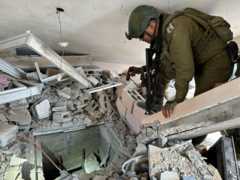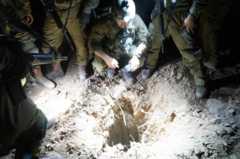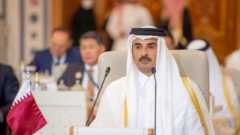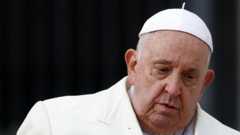Israel and Hamas have agreed a deal to release 50 hostages being held in Gaza during a four-day pause in fighting
- The start of the pause will be announced in the next 24 hours - if successful it will be the first break in fighting since 7 October
- On Wednesday morning, Israel confirmed its ground and air operation in Gaza is continuing, before the pause starts.
- Hamas says 150 Palestinian women and teenagers will be released from Israeli jails under the deal
- Up to another 150 Palestinians could be released - as well as another 50 hostages from Gaza - after the initial four-day pause
- Israel's government insists that this isn't the end of the war, reiterating its commitment to "complete the elimination of Hamas"
- Israel began attacking Gaza after Hamas fighters crossed the border on 7 October, killing 1,200 people and taking about 240 others hostage
- Gaza's Hamas-run health ministry says more than 14,000 people - including more than 5,000 children - have been killed in Israel's campaign.
As we've been reporting, the deal agreed between Israel and Hamas initially allows for 50 women and child hostages to be freed in batches by Hamas in exchange for a four-day pause in fighting. But the deal has, evidently, been structured to encourage further releases.
The incentive is a longer pause in fighting: “The release of every additional 10 hostages will result in one additional day in the pause,” the Israeli government statement says.
That clause is an important one for the hostage’s families, some of whom had told me they didn’t want to see a partial deal.
It is also expected that the 50 hostages to be released would be those with Israeli nationality or dual nationals.
An update now from the Israel Defense Forces (IDF), which says its troops have exposed and destroyed approximately 400 Hamas tunnel shafts since the start of the conflict on 7 October.
It adds that many of the shafts leading to its tunnel network are located within civilian hospitals, schools and homes.
The IDF also shared footage and images of tunnel entrances and interiors demonstrating these claims, which the BBC is not able to independently verify.
Israel has repeatedly accused Hamas of using civilians in Gaza as human shields, which Hamas denies.
Now for some diplomatic reaction to the deal struck between Israel and Hamas that will see the first break in fighting since 7 October - and the release of 50 hostages being held in Gaza.
The prime minister of Qatar, Sheikh Mohammed bin Abdulrahman bin Jassim Al Thani - who helped broker the truce - said in a statement he hoped it would pave the way for an end to the war.
UK Foreign Secretary David Cameron said the deal was a "crucial step" towards releasing hostages and providing humanitarian relief in Gaza, while French President Emmanuel Macron said work is being done "tirelessly" to free all hostages.
The truce was also welcomed by Palestinian Authority leader Mahmoud Abbas, the EU and countries including the US, Jordan, Russia, China, Egypt, France and Germany.
Pope Francis held separate meetings with Israeli families of hostages held by Hamas and Palestinians with relatives in Gaza.
He said the Israel-Hamas conflict had gone beyond war, becoming “terrorism”, and emphasised that “both sides are suffering.”
Speaking at his weekly general audience in St Peter’s Square, shortly after the meetings in his residence, the pontiff said: ”They suffer so much and I heard how both sides suffer.”
He added: "Please let us go forward for peace... My blessing goes to all."
The tiny nation of Qatar, positioned on a peninsula in the Persian Gulf, was once one the poorest countries in the Middle East but is now one of the richest.
In recent years, it has played key roles in negotiations around the world – not just in its own neighbourhood - and has led Israel and Hamas to ceasefire before.
Qatar’s leaders have for many years “pursued a strategy of talking to all sides - virtually all sides - in different conflicts in the Middle East and around the world,” says Georgio Cafiero of the group Gulf State Analytics.
It has also been involved in negotiations with countries including Venezuela, Chad and Sudan, he says.
"This is part of a foreign policy strategy aimed at making Doha increasingly valuable to as many different players on the international stage as possible," adds Cafiero.
Some governments have criticised Doha for its ties to extremist groups such as Hamas, and in 2017 Saudi Arabia led efforts to cut the country off, ostensibly to force it to abandon its relations with radical and Islamist groups.
Qatar says any ties with such groups are part of an independent policy of relations with regional actors and strongly denies supporting terrorism.
EVEN MORE DETAILS AT: https://www.bbc.co.uk/news/live/world-middle-east-67481139




No comments:
Post a Comment